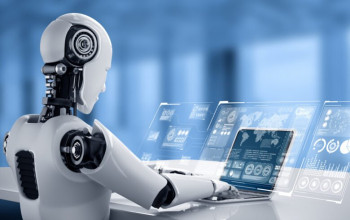The integration of AI in healthcare is transforming the way medical professionals diagnose, treat, and manage patient care. This article explores the profound impact of AI on healthcare, from improving diagnostic accuracy to enhancing patient experiences.
**1. Diagnostics and Disease Prediction**
One of the most significant contributions of AI in healthcare is its ability to assist in early disease detection and diagnosis. AI algorithms can analyze vast amounts of patient data, including medical records, imaging scans, and genetic information, to identify potential health issues. For instance, AI can detect abnormalities in X-rays, MRIs, and CT scans more accurately than humans. This early detection can lead to timely interventions and improved patient outcomes.
**2. Personalized Treatment Plans**
AI helps tailor treatment plans to individual patients. By analyzing a patient's medical history, genetics, and lifestyle, AI can recommend personalized treatment options that are more likely to be effective.
**3. Drug Discovery and Development**
The drug discovery process is lengthy and expensive. AI is streamlining this process by analyzing vast datasets to identify potential drug candidates and predict their effectiveness. This accelerates drug development and could lead to the discovery of novel treatments for various diseases.
**4. Virtual Health Assistants**
These digital assistants can answer patients' questions, schedule appointments, and provide medication reminders. They offer convenience and accessibility, especially for patients with chronic conditions who require continuous monitoring and support.
**5. Predictive Analytics for Hospital Management**
AI-driven predictive analytics are helping hospitals and healthcare institutions manage resources more efficiently. By analyzing historical patient data, AI can forecast patient admission rates, optimize staff scheduling, and allocate resources effectively. This leads to improved patient care and cost savings.
**6. Telemedicine and Remote Monitoring**
Telemedicine has seen a significant boost with the help of AI. Remote monitoring devices equipped with AI can track patients' vital signs and alert healthcare providers to any concerning changes. This allows for early intervention and reduces the need for frequent in-person visits, especially for patients with chronic conditions.
**7. Mental Health Support**
AI-powered chatbots and virtual therapists are providing mental health support to individuals in need. These systems can offer immediate assistance, provide coping strategies, and connect users with mental health professionals when necessary, addressing the growing demand for mental health services.
**8. Fraud Detection and Security**
AI plays a crucial role in safeguarding patient data and detecting healthcare fraud. Machine learning algorithms can identify unusual patterns in billing and claims, helping to prevent fraudulent activities and protect patient information.
**9. Ethical Considerations and Challenges**
While AI offers tremendous benefits to healthcare, it also raises ethical concerns. Privacy, data security, bias in algorithms, and the potential for job displacement in healthcare professions are all important issues that need careful consideration.
In conclusion, AI is transforming healthcare by enhancing diagnostics, personalizing treatments, streamlining drug discovery, and improving patient experiences. While the integration of AI presents challenges and ethical dilemmas, its potential to save lives and improve healthcare outcomes cannot be denied. As technology continues to advance, the healthcare industry must adapt and embrace these innovations to provide better care for all.



























